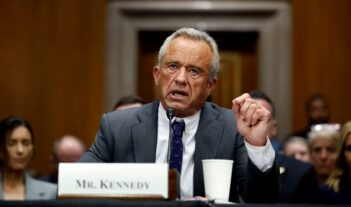
A federal bill that would expand data access for tribal health providers may not satisfy Native communities.
Despite a recent victory for Indigenous land rights, tribal communities are still fighting to regain control over another asset: their data.
In June, the Centers for Disease Control and Prevention (CDC) refused to share data about COVID-19 rates in Native communities that tribal epidemiology centers (TECs) requested. The CDC cited privacy concerns, as the data included identifying personal information.
State and local health agencies often struggle to obtain health data because of such privacy issues. But tribal health providers say that the real problem is a widespread misunderstanding of the relationship between TECs and other government health agencies. At the same time the CDC denied data requests from TECs, it made the same data available to states.
In August, many tribal epidemiologists still did not have access to the data on testing and infection rates that they needed to track the spread of the coronavirus in their communities.
In response, the U.S. House of Representatives passed the Tribal Health Data Improvement Act in early September. The bill amends the 1944 Public Health Service Act by adding references to tribes and TECs that authorize data sharing between federal and state agencies. As of this writing, the U.S. Senate Committee on Indian Affairs has yet to take action on the bill.
But even if this bill became law, the new law would not satisfy many Indigenous activists and health providers. These groups want tribal governments to have total control over all data on Native people and their health—including how data are collected, stored, and shared.
The House bill would not transfer control of any data that federal and state governments may collect to tribal governments. It would, however, confirm that TECs have the same data sharing privileges as federal and state health agencies. Such confirmation would have reduced confusion within the CDC about the role of TECs—confusion that has contributed to the agency’s refusal to share data with tribal epidemiologists.
TECs are public health authorities that collect and evaluate data on the health needs of Indigenous communities. Congress established TECs in the 1996 reauthorization of the Indian Health Care Improvement Act, although each TEC is independently run by regional and local tribal organizations. Congress permanently reauthorized the law, and TECs with it, in the 2010 Affordable Care Act.
Despite this legal authorization of tribal data collection and analysis, other legal and practical limitations on data sharing remain.
Some of these limitations stem from the unique relationship that tribes have with the federal government. Article I of the U.S. Constitution distinguishes “Indian tribes” from “foreign nations” and “the several states.” The U.S. Supreme Court has deemed tribes “domestic dependent nations” and part of a trust relationship with the federal government.
Federal policies have rendered tribes largely dependent on the federal government for aid and infrastructure. As a result, many Indigenous communities are subject to a complex web of federal and tribal governance and have a complicated relationship with states and municipalities, with whom they sometimes compete for resources.
Because of this history, some Indigenous scholars and activists worry that proposals such as the recent House bill may not lead to real change in public health data sharing. They argue that Indigenous people should not have to ask for data on their own bodies and lives. Instead, they contend that Native nations should have sovereignty—legal ownership and control—over any data on Indigenous people, places, things, and ideas.
Although the COVID-19 pandemic has strengthened calls for Indigenous data sovereignty, the movement began years earlier in New Zealand. The Māori Data Sovereignty Network, Te Mana Raraunga, launched in 2015 to advocate Māori governance of Māori data. This push for data sovereignty is rooted in the work of scholars who specialize in Indigenous research methods, such as Linda Tuhiwai Smith (Ngāti Awa, Ngāti Porou) of the University of Waikato.
Building on the Māori model, Native activists formed the United States Indigenous Data Sovereignty Network in 2016. Network members, as well as those affiliated with its Māori sibling, frame their advocacy as a natural outgrowth of efforts to return legal authority over tribal citizens, lands, and resources to Native nations.
This advocacy is, in part, a response to community memory of white scientists researching Indigenous communities without asking for consent, which led to widespread distrust of non-Native data collection efforts. It is also a recognition of the fact that Indigenous populations are often miscategorized when they are included in datasets.
A group of researchers at the Center for World Indigenous Studies found that, as of May 2020, neither the U.S. federal government nor state or local authorities had produced reliable COVID-19 data relating to any tribal community. Rudolph Rÿser (Cree/Oneida), the Center’s executive director, reportedly explained that the absence of a tribal census contributed to this scarcity of data. The CDC does not track Indigenous populations by tribal affiliation.
Indigenous data sovereignty advocates acknowledge that few tribal governments in the United States are currently equipped to fix these data collection issues. In addition, the Indian Health Service, part of the U.S. Department of Health and Human Services, lacks the funding and infrastructure to fill in the CDC’s gaps.
In October, then-candidate Joe Biden announced that, as President, he would direct the CDC and the U.S. Department of Health and Human Services to work with state and tribal health agencies to improve data sharing. In his policy plan, President Biden mentions increased health and crime data collection but does not elaborate on what that “collection” might look like, nor exactly how the federal government will improve its data sharing with Native nations.
U.S. Representative Deb Haaland (D-N.M.), the Interior Secretary nominee, may provide some hope for Native interests. After President Biden’s transition team announced Haaland’s nomination, she tweeted that she will “be fierce for all of us, our planet, and all of our protected land.”



